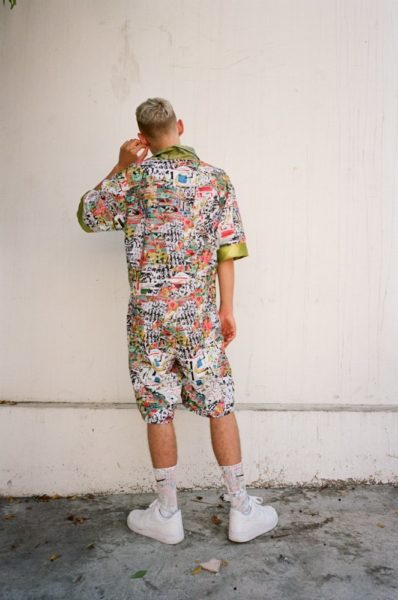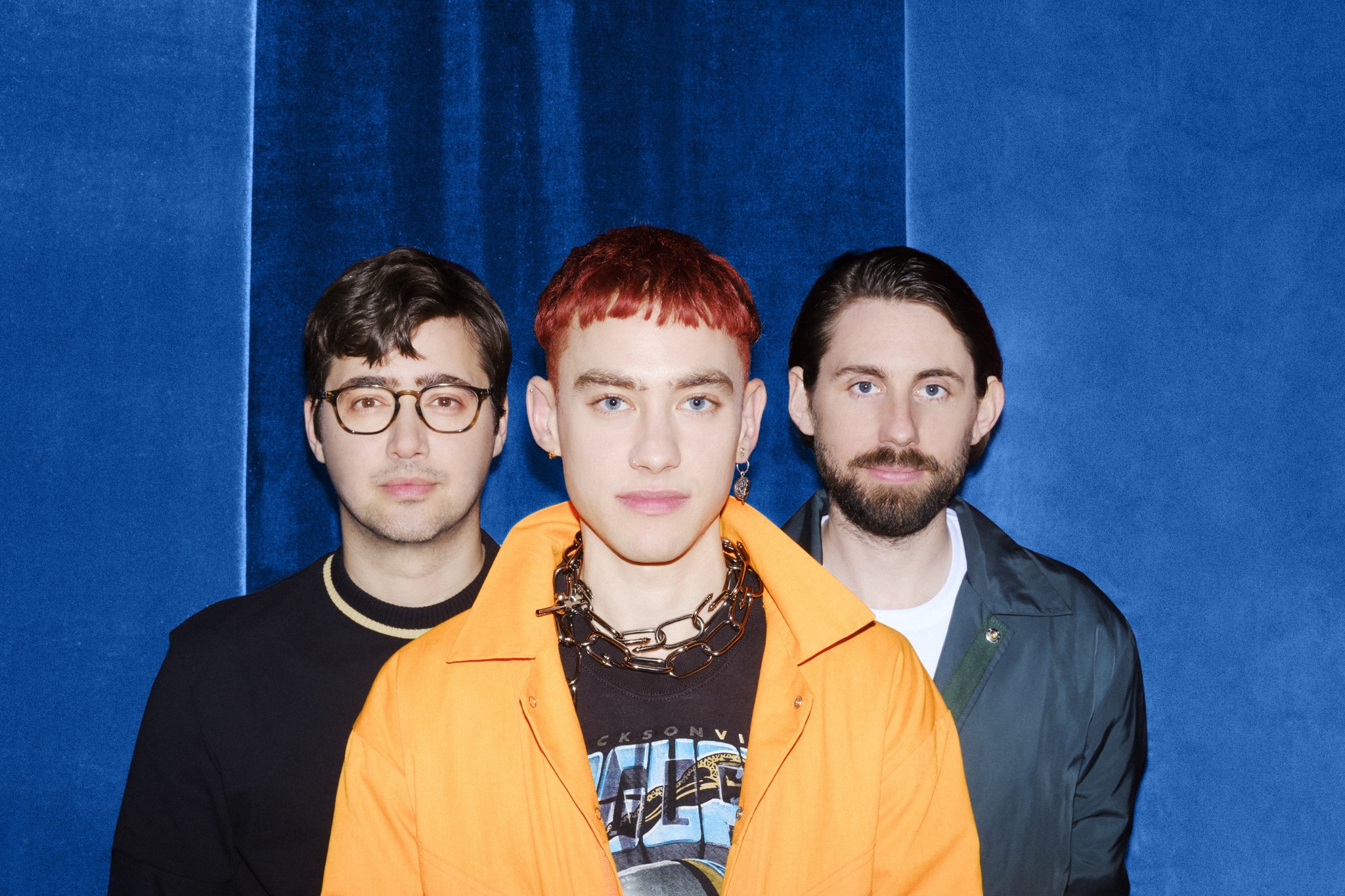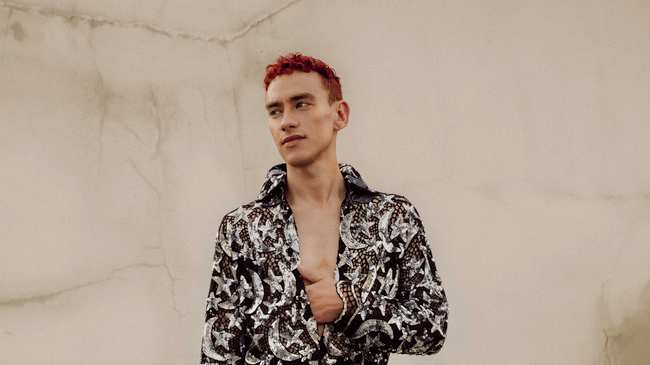Politics do not always manage to present themselves as a place for hope, but art certainly does – especially music. The scene would not be the same without great allies who are standing side by side with the community to spread encouragement, passion and strength. There is no doubt one of them is Olly Alexander, front singer of UK’s electro-pop band Years & Years. I had the pleasure to meet the adorable musician to chat a bit about their upcoming music, self-awareness and RuPaul’s Drag Race.
Olly Alexander is excited and there are good reasons for it: His band Years & Years did not only establish a household name for modern, joyful pop music, they are also on their best way to overcome the level of ‘difficult second album’ after 2015’s Communion. The band’s new tunes are revealing a more edgy side of the charismatic singer. He is more open with his desires and sexappeal than ever. Sanctify, the first single released in March this year, comes along with a reduced production and mature sound. In the single’s astonishing video viewers are taken into a dystopian city full of mystery:
‘I wanted to do something like pure kind of fantasy and escapism. In terms of the visuals and the music videos’, Olly explains. ‘I always live in my imagination, dreaming up stories. I love sci-fi and artists that create their own unique universe.’ It marks a new era of the forthcoming album, Palo Santo, which happens to be the name of a society where Alexander fights his way through different stages. The crowd contains of robotic human beings, ready to feel something through entertainment.
‘I thought: We should just aim as high as we can with the next album and do something that really surprise people. A lot of things that I think about and want to put in the music are topics like identity and sexuality, or mysticism. I wanted to express that in the music videos, so I settled on this idea of a futuristic android society.’

The videos aim to explore sexual expression and gender identity in a world thousands of years ahead of our time. Olly tries to get a hint of how today’s gender roles could translate or change in future. But there’s also a personal background for it as he explains: ‘I’ve been a performer for many years now. I find that is an interesting part of my own identity – how I’m constantly transmitting to an audience, for example. So I thought it could be interesting to focus on the audience, this androids. To make them feel something. It is really like an onion: I also wanted Sanctify to have a really fun pop-video.’
Fans can prepare for a futuristic vision of gender identity and sexuality. Both topics are extremely important when it comes to music from openly queer artists: While most pop stars are singing honestly about lust and desire without any hesitation, for LGBTQ+ musicians it becomes it is something bigger than just emotions and feelings. Love becomes a statement, the personal becomes political.
‘Being political is unavoidable. An LGBTQ+ life is politicized whether we like it or not’, Olly says. He continues ‘The sort of fight for LGBT rights and the history of that has shown we had to be political for the rights we have today. That fight is not over in lots of places around the world. On a personal level I understand when somebody might not want to engage politically due of their sexual preferences – because they do not feel an alliance to that, no values or it is just too complicated. But whoever we are now, I think, is politicized and we cannot escape that.’
Equality on all levels
Even with a growing number of queer artists in the music scene, there is still one thing worth noticing. By no dropping any names, most LGBTQ+ artists from mainstream pop are white cis males. While the community stands for individuality, diversity is still missing. ‘It is a big issue. When we talk about the LGBTQ+ community, it is so intersectional. We’ve seen predominant white cis man raising to the top, having success. That is wonderful, but we are lacking in kind of seeing the other sections of the community achieve the same’, the singer says. ‘When we are talking about equality for gay people, we do not get equality until we do not have equality for people of color, or for women.’
For Olly himself, the first step towards an equal future is to be aware of your own position:
‘I’m trying to be mindful of those inequalities, always. To have an awareness of my own privilege and recognize that my whiteness has been a contributing factor to my success. We have this conversations we would not have five or ten years ago, that is hopefully a step forwards.’

Self-awareness is not just a thing when it comes to the whole queer community, but especially when it comes to the singer himself. In a world of social media where presenting yourself as perfectly flawless has become an everyday habit, it is important to stick to the cold reality: we do all struggle, but we are not alone. In 2017 the singer revealed his battle with an eating disorder caused by depression and anxiety in the BBC documentary Growing Up Gay. One year later, ahead of a new chapter in his life, Olly still feels the need of speaking up about his own problems: ‘I’ve seen firsthand how being honest myself with the issues I faced growing up has an impact on other people. Being depressed, having anxiety, going through therapy and being on medication. It does inspire people to be open about what they are going through. You establish a connection which otherwise they might feel more alone. I found that sharing and speaking, putting into words what you are feeling is a first step to get a better understanding about mental health. I think it is super important to doing that –speaking out.’
When it comes to social media directly, Olly balances between its pros and cons: ‘What has been great with social platforms is that it connected people who never would connect without it. All this online communities were build. People have connected in a way they were never connecting before. Of course it can get strange: you are interacting with the world and you are already performing a version of yourself. You have to be mindful of the whole situation. I am trying to have a little bit of a barrier between myself and social media. It is kind of real and kind of not. I am 27 now, but for younger people the battlefield of social media can be traumatizing.’
Besides new music and a perfect online representation we also took a moment to chat about recent queer moments in media, like the Oscar-awarded drama Call Me By Your Name by Italian filmmaker Luca Guadagnino. Starring actors Armie Hammer and rising star Timothée Chalamet, the film tells the story of two young men falling for each other. A surprising hit in theaters in the US last summer and in Europe this year, it found his way to the mainstream audience. The queer community was less impressed: a gay story directed and played by an all-straight cast.
‘I heard about the film but have not seen it yet’, Olly tells me. ‘I think something like this can have many plus points and a certain benefit. It is able to raise awareness and presenting gay characters in a positive way. It might be introducing a story line to viewers which are not necessarily keen with such topics. But you can also except that it is not representing the community in an authentic way. That there is a lot further to go for that representation. We cannot expect one movie to resolve all our problems. The kind of dialogue about a possible hypocrisy of such a movie is good. It is good to have such opinions and listen to both sides.’
More battles to be fought …
Still, there is one thing the singer just cannot ignore nowadays: ‘RuPaul’s Drag Race has had such an explosion into the mainstream. It has been an interesting thing to happen, it started as a show that seemed like it is truly for the drag community, the gay and queer community. And as we see its popularity rise it automatically becomes something more for the masses. As a show it has changed by that, but I still watch the show and I enjoy it. At the same time I was grateful about the recent discussion around the trans-representation on the show. People have held RuPaul accountable for the things he said and the way he had treated trans people on the show.’
Olly is referring to statements made by RuPaul himself in March this year about transgender contestants on the show. In an interview the drag queen claimed that the rebellious act of doing drag against a male-dominated culture is lost after a man underwent a transition to a woman.

Photo: Universal Music
‘It was a painful discussion’, the singer continues. ‘Some taught RuPaul is getting attacked too hard, others could relate to the criticism, but it is important to talk about such things. It bubbled up to the mainstream and started to be exposed. It is also amazing that the contestants, those queens, have the success they have after the show and are travelling the world. Putting on shows and connecting with fans. They mean so much to them and that is amazing.’
It becomes clear that the entrance of the queer scene into the mainstream will not happen without a backlash from the own community – and that is perfectly reliable. Mainstream media, no matter if music, film or other forms, works with easy imagery, often black and white to reach quickly the biggest crowd possible. But the LGBTQ+ community is not a catchy pop banger or blockbuster movie. It represents individual stories, each different from another. There are more battles to be fought and anthems to be written, but with hope and passion every mountain can be climbed.
‘Hope and passion means feeling alive. You want to wake up and see what the next day will bring. Being full of life. You want to connect, you want to meet people and fall in love. Having adventures. That is what it means to me. We can use all of it a bit more.’
Palo Santo is out July 6, 2018.



